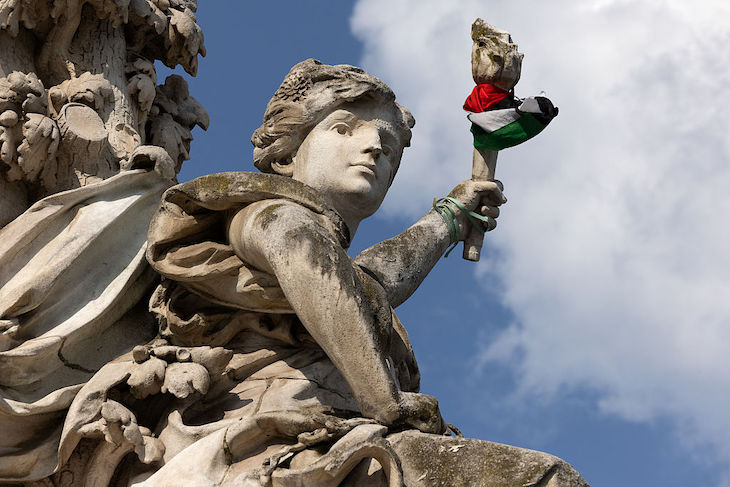Emmanuel Macron has announced that France will recognise Palestinian statehood. The French president will make his historic proclamation, the first among G7 countries, at the UN General Assembly in September. In a statement on X, Macron said that ‘there is no alternative’, adding that ‘the French people want peace in the Middle East’.
The rhetoric is inflammatory, and honest, but it’s not what Emmanuel Macron wants to hear
Many French people, however, do not want their country to recognise Palestine in the manner Macron intends. A poll last month found that only 22 per cent were in favour of immediate and unconditional recognition; 31 per cent were opposed and 47 per cent would accept recognition once Hamas had laid down its arms and released all the Israeli hostages.
Not for the first time, Macron is swimming against the tide of public opinion in France. Jordan Bardella, president of the National Rally, condemned what he called a ‘hasty decision’. Even some of Macron’s centrists MPs disapproved. Caroline Yadan, said it was a ‘political, moral and historical mistake’.
The left, however, from the Greens to the Communists to the radical la France Insoumise, are delighted. Jean-Luc Melenchon, the leader of the latter, described the decision as a ‘moral victory’. As usual, Macron has sided with the progressive left, as he does on all the major issues of the day: Palestine, mass immigration, assisted dying, law and order and Net Zero.
This should surprise no one. ‘I am left-wing,’ he proclaimed in 2016. ‘That is my history.’ It also explains why he and Keir Starmer are ‘firm friends’.
As a consequence, there is growing discontent within Macron’s coalition government from those ministers who hail from the right. In May, Macron scolded three of them, Bruno Retailleau, Gerald Darmanin and Sophie Primas, for their failure to toe the party line and for being too ‘ambitious’.
How ironic. When Macron declared his allegiance to the left in 2016, it was as a justification for launching his own party, En Marche. At the time he was serving as the minister of the economy in Francois Hollande’s Socialist government. The left, said Macron, was ‘my family’ but ‘part of my family is afraid of a changing world’.
The Socialist party wasn’t progressive enough for Macron. So he quit and ran for president, winning the election after the favourite, the conservative Francois Fillon, was brought down by a financial scandal – a scandal many on the right believe was engineered by the deep state.
One of Fillon’s closest advisors during his ill-fated campaign was Bruno Retailleau, who since September has served in Macron’s coalition government as his Minister of the Interior. The pair can’t stand the sight of each other.
The depth of their mutual disdain was laid bare on Wednesday in an interview with Valeurs actuelles, a conservative magazine not a million miles ideologically from The Spectator, to whom Retailleau also spoke this week.
Retailleau was withering in his summation of ‘Macronism’, saying it will die as soon as the president leaves office in 2027 ‘because Macronism is neither a political movement nor an ideology: it is essentially based on one man’.
It is a cult, in other words, with a leader who demands devotion from his followers. Woe betide those whose faith wavers. Macron has worked his way through 158 ministers since 2017, more than any other president of the Fifth Republic.
But will he dare dispense with Retailleau, his most defiant minister to date, the man who declared this week that he doesn’t believe in Macronism because it ‘fuels powerlessness’? Sack Retailleau and the fragile government would likely come crashing down.
The pair were scheduled to have a one-to-one meeting at the Elysee on Thursday morning, but Macron cancelled at the 11th hour and, according to the French media, instructed his prime minister ‘to restore discipline among his troops’.
A dressing down from Francois Bayrou is unlikely to have much effect on Retailleau. If he has lost respect for the president, why should he retain it for his prime minister, a long-time political ally?
The French people appear to have given up on the pair; an opinion poll this week revealed that Bayrou’s approval rating is at 18 per cent, one point behind the president’s, which is a record low in his eight years in office.
Retailleau’s dilemma is whether to stay in his post, or to leave and focus on his presidential campaign. He said this week that he wants to achieve a ‘union of right-wing voters…in order to win in 2027’ because of the very real possibility that a divided right could result in a victory for the left.
The left encompasses not just Mélenchon, the Socialists and the Greens but also the progressivism practised by Macron’s party. ‘Everyone should agree on the failure of progressivism,’ explained Retailleau. ‘Progressivism has detached the individual from society…it is up to the right to propose a social project that breaks with the principles laid down by the left.’
Remaining in government gives Retailleau a platform to address the public, which he did on Thursday. On a visit to a Paris police station, Retailleau pledged his unflinching support to officers across the country who have come under attack from mobs of youths this month. ‘On one side, there is the France of heroes, and on the other, the France of bastards, who shoot at our police officers, our gendarmes and our firefighters,’ he said.
The rhetoric is inflammatory, and honest, but it’s not what Emmanuel Macron wants to hear. He is in denial about the disintegration of France, preferring to focus his energy on bringing peace to Gaza and Ukraine.
Retailleau’s priority is France. He remains in government, he says, because he is ‘motivated by a deep conviction: only France’s interests matter.’
Macron’s deep conviction is the EU. That is the fundamental difference between him and Retailleau; one puts France first and other believes Brussels is paramount.








Comments